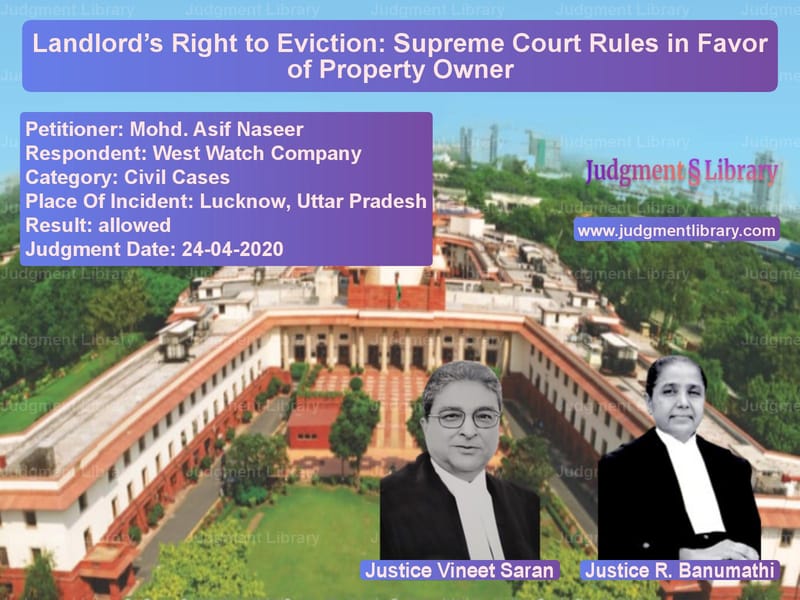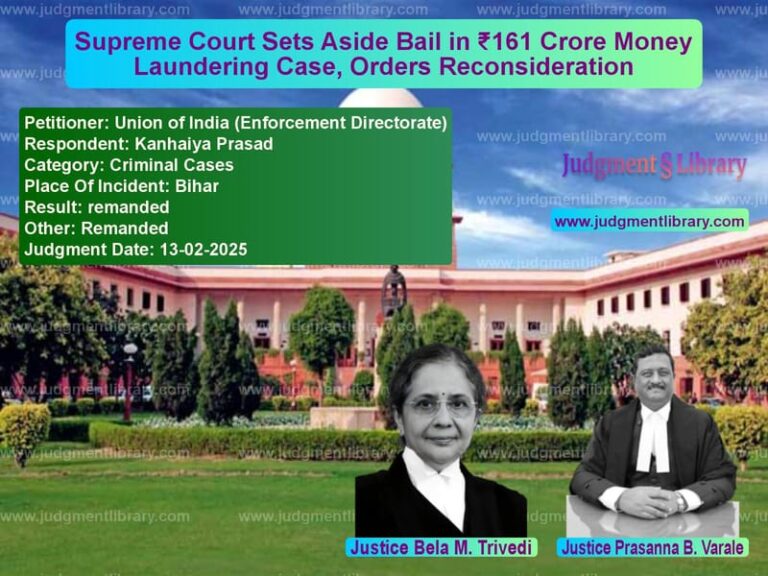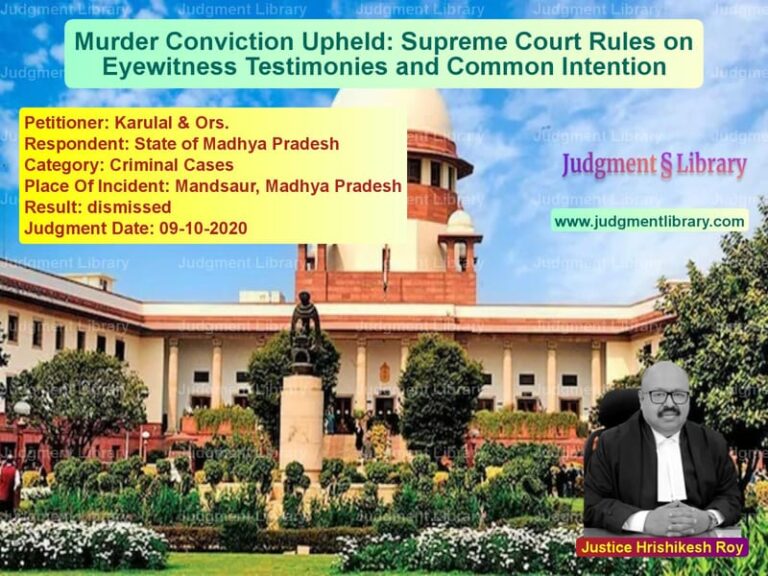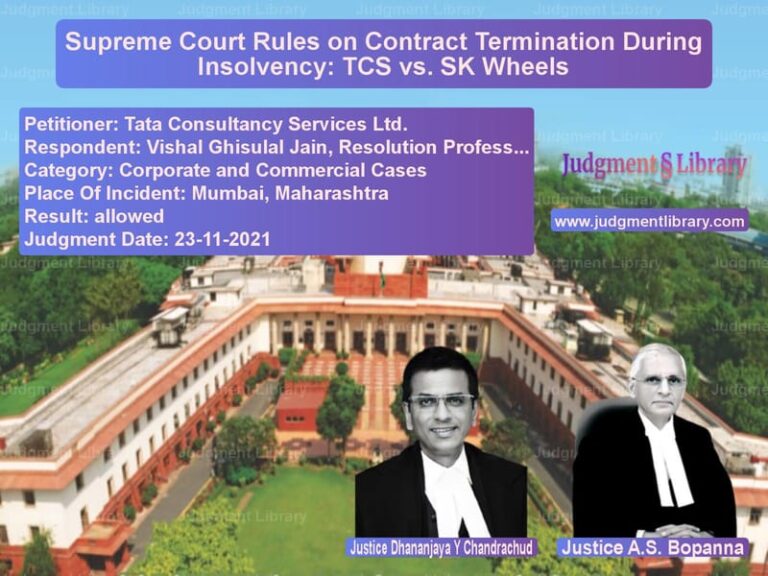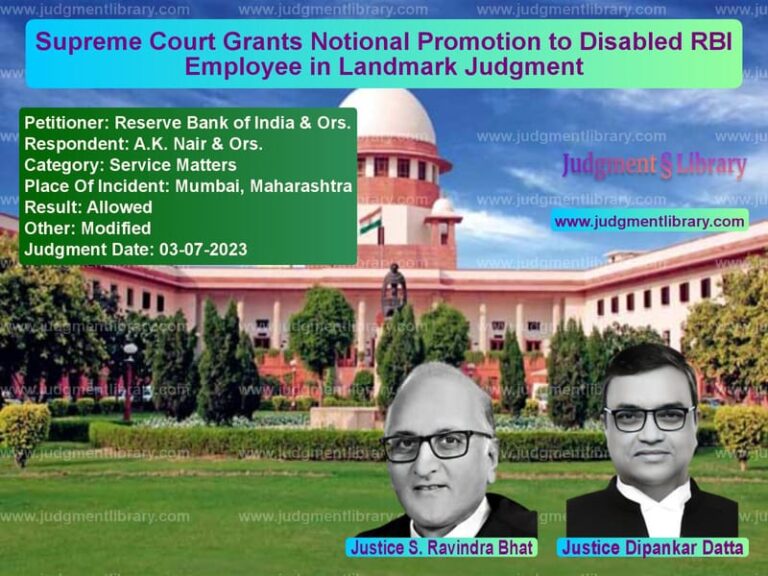Landlord’s Right to Eviction: Supreme Court Rules in Favor of Property Owner
The case of Mohd. Asif Naseer vs. West Watch Company involved a dispute over a rental property located in Hazratganj, Lucknow. The appellant, a landlord, filed for eviction of the respondent, a tenant, under the U.P. Urban Buildings (Regulation of Letting, Rent and Eviction) Act, 1972 (commonly referred to as the ‘Rent Control Act’). The Supreme Court was tasked with determining whether the eviction request was legally valid, considering the landlord’s need for the shop and compliance with the notice requirements of the Act.
The case had previously gone through the Rent Control Tribunal and the High Court, leading to conflicting decisions. The Supreme Court ultimately ruled in favor of the landlord, reinforcing the principle that genuine personal need for the property is a valid ground for eviction.
Background of the Case
The dispute centered around Shop No. 64, situated on the ground floor of Building No. 31/72, Mahatma Gandhi Marg, Hazratganj, Lucknow. The appellant, Mohd. Asif Naseer, purchased the shop through a registered sale deed on 29.10.2004. The respondent, West Watch Company, had been a tenant in the shop for decades, paying a monthly rent of Rs. 15.
The landlord filed a release application under Section 21(1)(a) of the Rent Control Act, asserting:
- He had purchased the property for personal use.
- He wanted to start his own business of repairing and selling watches.
- The tenant owned other properties and commercial accommodations in prime locations of Lucknow.
- The tenant had initially agreed to vacate the premises but later refused.
The tenant countered these claims, arguing:
- The shop was his only source of livelihood.
- He had been running the business since 1951.
- Despite efforts, he could not find an alternative shop in the locality.
- The landlord was in the real estate business and intended to demolish and redevelop the property for financial gain.
Petitioner’s Arguments (Mohd. Asif Naseer)
The landlord argued that his need for the shop was bona fide and pressing. His counsel contended:
- “The landlord is a young entrepreneur with significant experience in the watch business, assisting his father in the same trade. He has a legitimate requirement for the property.”
- “The tenant has ample financial resources and multiple commercial properties in Lucknow, whereas the landlord has no other shop.”
- “A notice was duly sent to the tenant before filing the eviction suit, complying with legal provisions.”
- “The tenant’s reluctance to vacate is unreasonable and an abuse of tenancy laws, which are meant to protect genuine tenants, not those who have alternative business locations.”
Respondent’s Arguments (West Watch Company)
The tenant’s defense primarily relied on long-term occupancy and hardship arguments. The respondent submitted:
- “The shop has been the primary business location for decades, and relocation would cause severe financial distress.”
- “The landlord’s real motive is not personal need but redevelopment and commercial exploitation.”
- “The legal requirement of serving six months’ notice was not met, making the eviction plea procedurally defective.”
- “Even if the landlord has a valid claim, the balance of hardship favors the tenant, who would be left without an alternative commercial space.”
Supreme Court’s Observations
The Supreme Court closely examined the legal provisions under Section 21(1)(a) of the Rent Control Act and observed:
- “The primary issue in eviction matters is whether the landlord’s need is genuine and bona fide. The evidence clearly establishes that the landlord requires the premises for his personal business.”
- “The tenant has not demonstrated significant hardship, given that he possesses other commercial properties.”
- “The High Court erred in overturning the findings of the Rent Control Tribunal and Appellate Authority, both of which correctly ruled in favor of the landlord.”
- “The contention that the landlord intended to demolish and redevelop the property is speculative and unsupported by evidence.”
Addressing the issue of notice, the Court held:
“The appellant has adequately demonstrated that notice was served to the tenant. Compliance with procedural requirements should not be used as a mere technicality to deny a genuine landlord’s claim.”
Final Judgment
The Supreme Court ruled in favor of the landlord:
- The appeal was allowed, and the High Court’s decision was set aside.
- The release application for eviction was granted.
- The tenant was directed to vacate the shop within six months.
- The landlord was ordered to compensate the tenant with two years’ rent.
Implications of the Judgment
This ruling reinforces key legal principles in landlord-tenant disputes:
- Genuine personal need is a valid ground for eviction.
- Long-term occupancy alone does not grant a tenant absolute rights.
- Procedural compliance should not be misused to obstruct rightful eviction claims.
- The financial condition of both landlord and tenant is a key consideration in balancing hardship.
The judgment upholds the rights of property owners while ensuring that tenants are treated fairly within the framework of the law.
Petitioner Name: Mohd. Asif Naseer.Respondent Name: West Watch Company.Judgment By: Justice Vineet Saran, Justice R. Banumathi.Place Of Incident: Lucknow, Uttar Pradesh.Judgment Date: 24-04-2020.
Don’t miss out on the full details! Download the complete judgment in PDF format below and gain valuable insights instantly!
Download Judgment: Mohd. Asif Naseer vs West Watch Company Supreme Court of India Judgment Dated 24-04-2020.pdf
Direct Downlaod Judgment: Direct downlaod this Judgment
See all petitions in Landlord-Tenant Disputes
See all petitions in Property Disputes
See all petitions in Specific Performance
See all petitions in Judgment by Vineet Saran
See all petitions in Judgment by R. Banumathi
See all petitions in allowed
See all petitions in supreme court of India judgments April 2020
See all petitions in 2020 judgments
See all posts in Civil Cases Category
See all allowed petitions in Civil Cases Category
See all Dismissed petitions in Civil Cases Category
See all partially allowed petitions in Civil Cases Category

